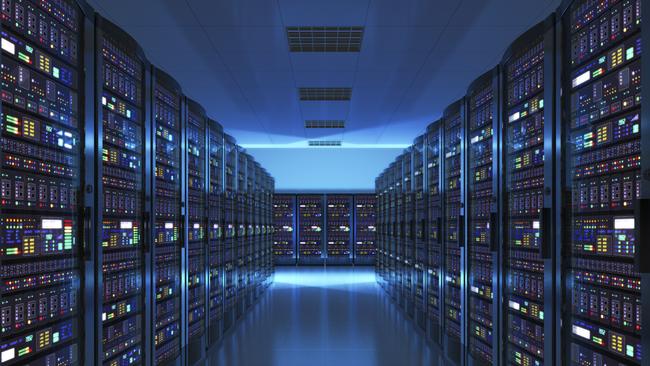Faltering energy transition risks slamming the brakes on AI and data centre expansion, says cloud storage boss
Australia’s biggest businesses have embraced generative AI, but a lack of reliable power supply threatens to undermine the building of data centres needed to power the tech.
Australia’s faltering renewable energy transition threatens to slam on the brakes on the rapid adoption of AI models and tools across the economy, given the vast amount of electricity the technology uses.
That’s the warning from Dave Friend, the co-founder and chief executive of Boston-based cloud storage provider, Wasabi Technologies.
Mr Friend launched his first company in the 1970s, making synthesisers for Led Zeppelin, Stevie Wonder and George Lucas’s Star War films. He has seen trends come and go, but says data storage represents significant exponential growth, as companies hold onto more information for longer to train generative AI models.
“We have like 65,000 or 70,000 customers, but even if we never added one additional customer, by next year we would be 50 per cent larger just because everybody stores more data,” Mr Friend said.
This has sparked the need for more data warehouses, with Microsoft announcing in October that it would spend $5bn – its biggest investment in Australia – building nine new data storage centres to power the explosion in cloud computing from the widespread uptake of artificial intelligence.
The need for more storage has catapulted Wasabi – founded five years ago – to a valuation of $US1.1bn ($1.63bn), after Mr Friend raised $US250m from investors earlier this year.
But he said finding property to build the centres wasn’t the biggest challenge – it was ensuring access to reliable electricity to power the graphic processing units (GPUs) within the warehouses.
“You can usually find the floor space to put your equipment in. But the harder part is finding a data centre that has enough power to run everything.
“Some places like Singapore have kind of put a moratorium (which it lifted in July) on data centre expansion because they just don’t have enough capacity to power both the data centres and industry and homes and streetlights and all the rest of it.
“Then there is a lot of political resistance to building more electricity capacity. People want to put wind turbines in, and then people scream – they don’t want wind turbines in their backyard. They want to put in solar panels, and environmentalists scream ‘you can’t put solar panels in the desert because it will have environmental impacts’”.

It’s a problem Australia is grappling to solve. Businesses have criticised state governments for setting their own 2035 emissions reduction targets ahead of the commonwealth, arguing the haphazard approach will increase the risk of the electricity grid failing.
Australian Industry Group chief executive Innes Willox – who represents energy, manufacturing and building businesses – said this week that premiers were putting the grid reliability at risk “because of short-term thinking aimed at proving their environmental credentials”.
“Already this summer, parts of our grid are being stretched to nearly breaking point as regulators, energy providers and users struggle to work through the closure of established facilities and manage the energy transition,” Mr Willox said.
Without reliable electricity supply to power data centres, Australia risks not having sufficient sovereign capacity to power generative AI engines, which chief executives have touted as one of the biggest ways to lift flatlining productivity and combat inflation.
Mr Friend said: “It could really hamstring your economy”.
“This (AI) stuff is generating huge amounts of revenue, or it will generate huge amounts of revenue.
“Everyone has got the same problem. In Europe, in France, they rely a lot on nuclear. And the US still has got a bit of a mentality that you drill for more oil and burn more petroleum products. But some of the biggest data centre areas are up in the northwest in Washington and Oregon, where they get very cheap hydropower from the Columbia River.
“Microsoft, Google and Facebook – everyone has big data centres up there because they get a lot of very inexpensive renewable energy.”
Wasabi – named after the spicy Japanese condiment, given it uses what is known as “hot storage” to retrieve data, rather than more cumbersome “cold storage”, which uses tape – has made a name for itself by undercutting big players like Amazon, Google and Microsoft by 80 per cent on storage costs.
In an era in which companies are in a race to diversify, to spread risk, Mr Friend said he has focused on offering one core product and making sure he does it well.
“By just focusing on storage, we feel we can get ahead of these guys. We’ve raised a lot of money, and we have a pretty big engineering staff focused only on storage, and we’re starting to pull ahead of the other guys because they got all this other stuff to worry about.
“They haven’t innovated in storage at all because they’ve been so busy on blockchain, voice recognition, image recognition, all this other stuff that they’re working on. These things swing from conglomerate to speciality, but I think there is a need for both.
“I can buy running shoes at Macy’s, but I might try to go to the Nike store, where the sales people understand the products and so forth. The one-stop shop like Amazon, where … they’ll have 100 different products, and they’ll all be mediocre. (That) can be very valuable for certain customers.
“But our strategy is nothing new. One thing about getting old is you’ve kind of seen it all before. Human nature doesn’t really change.”



